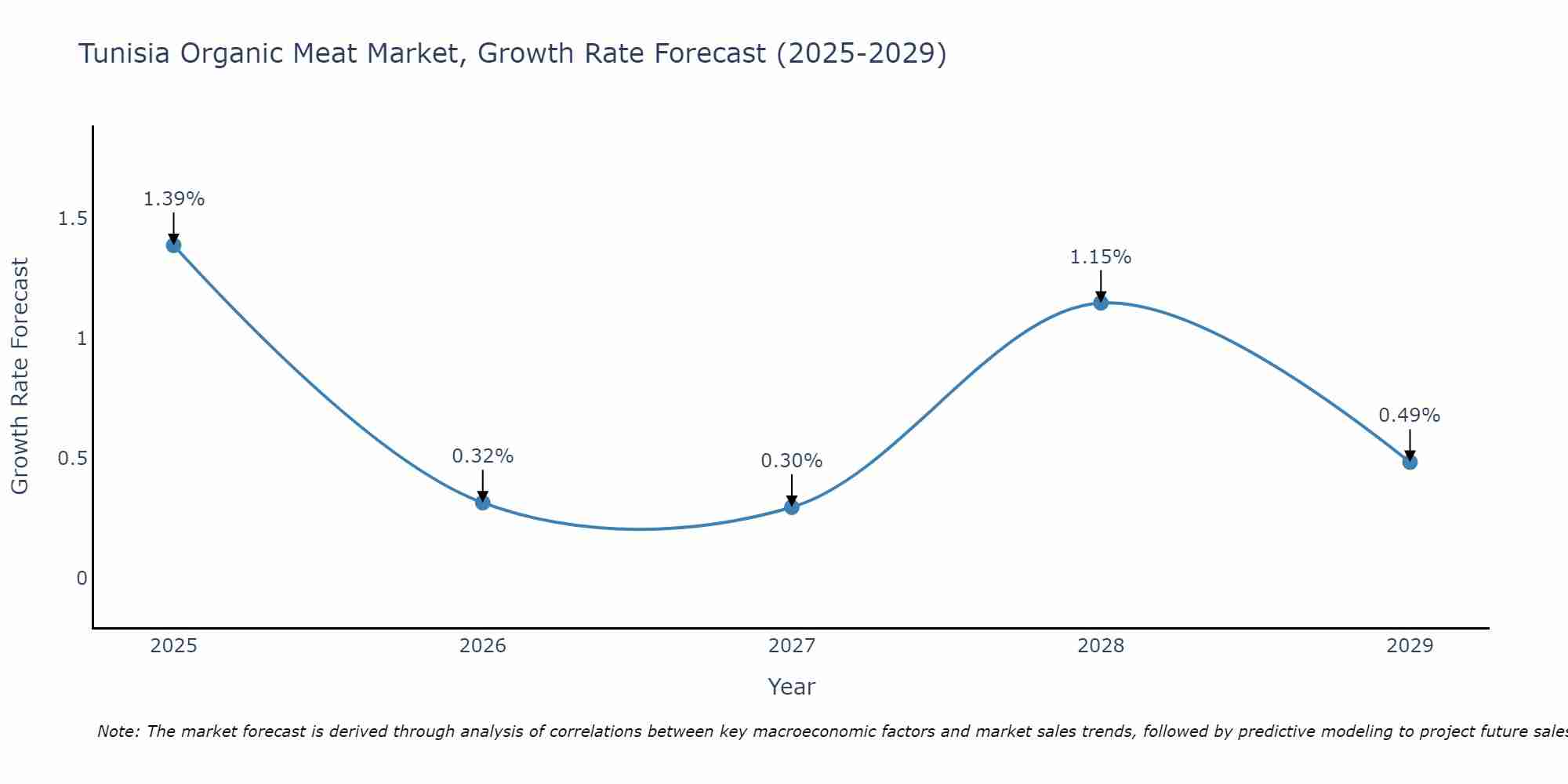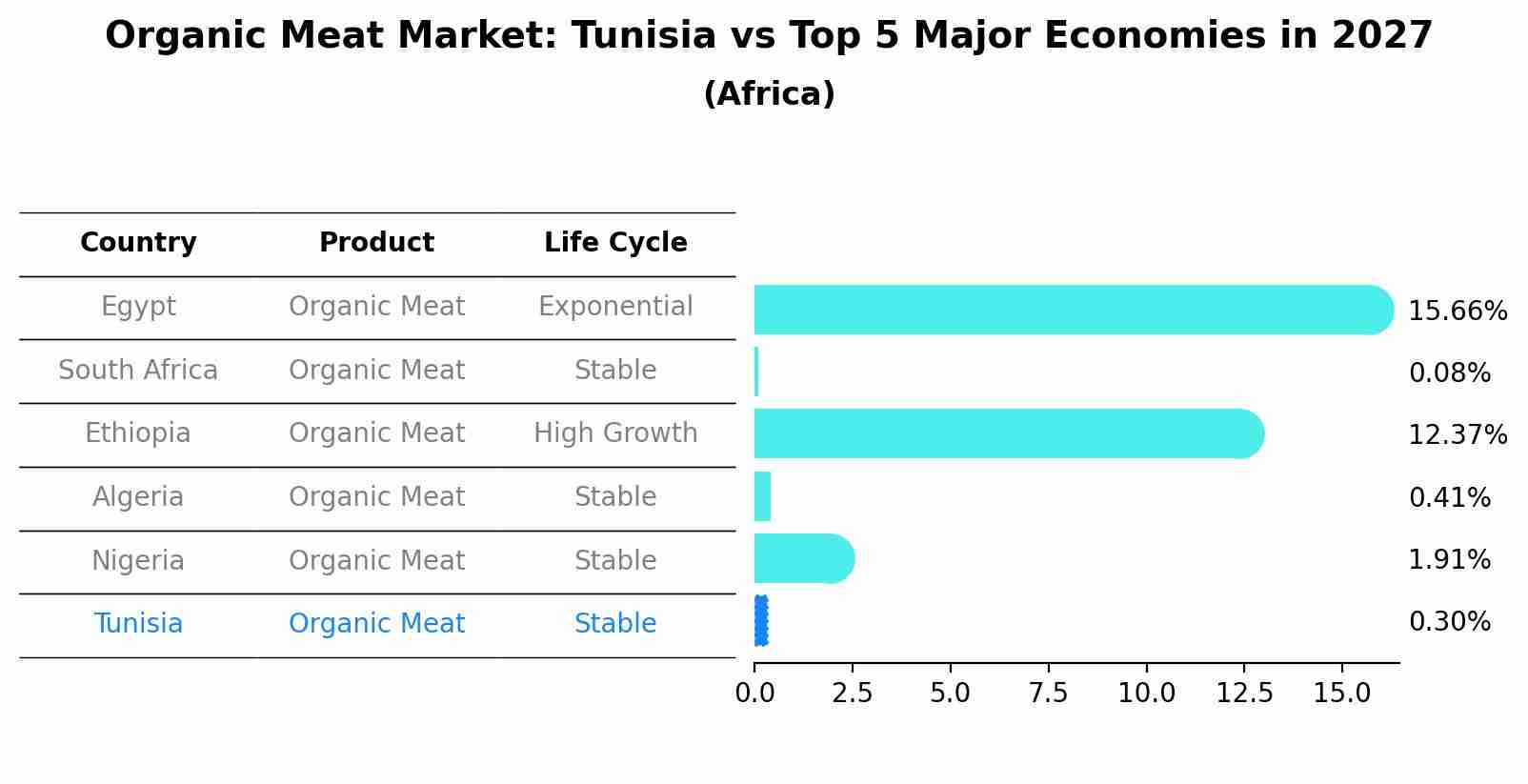Tunisia Organic Meat Market (2025-2031) Outlook | Value, Size, Forecast, Companies, Industry, Revenue, Trends, Growth, Analysis & Share
| Product Code: ETC383634 | Publication Date: Aug 2022 | Updated Date: Jul 2025 | Product Type: Market Research Report | |
| Publisher: 6Wresearch | Author: Dhaval Chaurasia | No. of Pages: 75 | No. of Figures: 35 | No. of Tables: 20 |
Tunisia Organic Meat Market Size Growth Rate
The Tunisia Organic Meat Market is projected to witness mixed growth rate patterns during 2025 to 2029. Although the growth rate starts strong at 1.39% in 2025, it steadily loses momentum, ending at 0.49% by 2029.

Organic Meat Market: Tunisia vs Top 5 Major Economies in 2027 (Africa)
By 2027, Tunisia's Organic Meat market is forecasted to achieve a stable growth rate of 0.30%, with Egypt leading the Africa region, followed by South Africa, Ethiopia, Algeria and Nigeria.

Tunisia Organic Meat Market Synopsis
The Tunisia Organic Meat Market is experiencing steady growth driven by increasing awareness of the benefits of organic food consumption among health-conscious consumers. The market is characterized by a rising demand for organic meat products, including beef, poultry, and lamb, due to concerns over food safety and sustainability. Key players in the market are focusing on expanding their product offerings and distribution channels to cater to the growing consumer demand. Government initiatives to promote organic farming practices and the presence of certification programs are also contributing to market growth. However, challenges such as high production costs and limited availability of organic feed remain barriers to further market expansion. Overall, the Tunisia Organic Meat Market presents opportunities for market players to capitalize on the growing consumer preference for organic and sustainable food products.
Tunisia Organic Meat Market Trends
In Tunisia, the organic meat market is experiencing steady growth driven by increasing consumer awareness of the benefits of organic products, including higher nutritional value and animal welfare standards. Consumers are increasingly seeking organic meat options due to concerns about health and sustainability. Local organic meat producers are expanding their product offerings to meet this growing demand, with a focus on transparency in sourcing and production methods. Additionally, there is a trend towards online platforms and specialty stores that offer a wide selection of organic meat products, making it more convenient for consumers to access these goods. Overall, the Tunisia organic meat market is expected to continue growing as consumers prioritize quality and ethical considerations in their food choices.
Tunisia Organic Meat Market Challenges
In the Tunisia Organic Meat Market, several challenges exist, including limited consumer awareness and education about organic products, leading to low demand. Additionally, there is a lack of clear regulations and standards for organic meat production and certification, which can hinder market growth and consumer trust. Farmers also face challenges in terms of access to organic feed, veterinary care, and technology to meet the stringent requirements for organic certification. Furthermore, the high production costs associated with organic farming practices, such as feed, labor, and certification fees, can make organic meat products more expensive than conventional options, further limiting consumer adoption. Overall, addressing these challenges through improved education, regulations, support for farmers, and market development efforts is crucial for the growth and sustainability of the Tunisia Organic Meat Market.
Tunisia Organic Meat Market Investment Opportunities
The Tunisia Organic Meat Market presents promising investment opportunities due to the increasing consumer demand for healthier and ethically produced meat products. With a growing awareness of the benefits of organic farming practices, there is a rising trend towards organic meat consumption in Tunisia. Investors can consider opportunities in organic livestock farming, processing facilities, distribution networks, and retail outlets specializing in organic meat products. Collaborating with local farmers to promote sustainable and organic farming practices could also be a lucrative investment avenue. Additionally, leveraging technology for traceability and quality assurance in the organic meat supply chain can further enhance market competitiveness and attract environmentally conscious consumers. Overall, investing in the Tunisia Organic Meat Market aligns with the global shift towards sustainable and organic food consumption, making it a strategically sound investment choice.
Jordan Agar Market Government Policies
The Tunisian government has implemented several policies to support the organic meat market in the country. These policies include the promotion of sustainable agricultural practices, financial incentives for organic farming, and the establishment of organic certification standards. The government has also introduced regulations to ensure the quality and safety of organic meat products, as well as to promote transparency in the supply chain. Additionally, there are initiatives to increase consumer awareness and demand for organic meat through education and marketing campaigns. Overall, these government policies aim to foster the growth of the organic meat market in Tunisia by creating a supportive regulatory environment and encouraging the transition towards more sustainable and environmentally friendly agricultural practices.
Tunisia Organic Meat Market Future Outlook
The future outlook for the Tunisia Organic Meat Market appears promising due to the increasing consumer awareness regarding health and wellness, as well as a growing trend towards sustainable and ethical food production. With rising concerns about food safety and environmental impact, consumers are seeking organic meat products that are free from synthetic chemicals, hormones, and antibiotics. This shift in consumer preferences is expected to drive the demand for organic meat in Tunisia, leading to potential market growth opportunities for producers and retailers. Government initiatives promoting organic farming practices and certifications further support the market`s development. However, challenges such as higher production costs and limited availability of organic feed may impact the market`s growth trajectory, requiring strategic planning and investment to capitalize on the expanding organic meat market in Tunisia.
Key Highlights of the Report:
- Tunisia Organic Meat Market Outlook
- Market Size of Tunisia Organic Meat Market, 2024
- Forecast of Tunisia Organic Meat Market, 2031
- Historical Data and Forecast of Tunisia Organic Meat Revenues & Volume for the Period 2021 - 2031
- Tunisia Organic Meat Market Trend Evolution
- Tunisia Organic Meat Market Drivers and Challenges
- Tunisia Organic Meat Price Trends
- Tunisia Organic Meat Porter's Five Forces
- Tunisia Organic Meat Industry Life Cycle
- Historical Data and Forecast of Tunisia Organic Meat Market Revenues & Volume By Type for the Period 2021 - 2031
- Historical Data and Forecast of Tunisia Organic Meat Market Revenues & Volume By Poultry for the Period 2021 - 2031
- Historical Data and Forecast of Tunisia Organic Meat Market Revenues & Volume By Beef for the Period 2021 - 2031
- Historical Data and Forecast of Tunisia Organic Meat Market Revenues & Volume By Pork for the Period 2021 - 2031
- Historical Data and Forecast of Tunisia Organic Meat Market Revenues & Volume By Others for the Period 2021 - 2031
- Historical Data and Forecast of Tunisia Organic Meat Market Revenues & Volume By Application for the Period 2021 - 2031
- Historical Data and Forecast of Tunisia Organic Meat Market Revenues & Volume By Food Services for the Period 2021 - 2031
- Historical Data and Forecast of Tunisia Organic Meat Market Revenues & Volume By Retail for the Period 2021 - 2031
- Historical Data and Forecast of Tunisia Organic Meat Market Revenues & Volume By Distribution Channel for the Period 2021 - 2031
- Historical Data and Forecast of Tunisia Organic Meat Market Revenues & Volume By B2C for the Period 2021 - 2031
- Historical Data and Forecast of Tunisia Organic Meat Market Revenues & Volume By B2B for the Period 2021 - 2031
- Tunisia Organic Meat Import Export Trade Statistics
- Market Opportunity Assessment By Type
- Market Opportunity Assessment By Application
- Market Opportunity Assessment By Distribution Channel
- Tunisia Organic Meat Top Companies Market Share
- Tunisia Organic Meat Competitive Benchmarking By Technical and Operational Parameters
- Tunisia Organic Meat Company Profiles
- Tunisia Organic Meat Key Strategic Recommendations
Frequently Asked Questions About the Market Study (FAQs):
- Single User License$ 1,995
- Department License$ 2,400
- Site License$ 3,120
- Global License$ 3,795
Search
Thought Leadership and Analyst Meet
Our Clients
Related Reports
- Afghanistan Apparel Market (2026-2032) | Growth, Outlook, Industry, Segmentation, Forecast, Size, Companies, Trends, Value, Share, Analysis & Revenue
- Canada Oil and Gas Market (2026-2032) | Share, Segmentation, Value, Industry, Trends, Forecast, Analysis, Size & Revenue, Growth, Competitive Landscape, Outlook, Companies
- Germany Breakfast Food Market (2026-2032) | Industry, Share, Growth, Size, Companies, Value, Analysis, Revenue, Trends, Forecast & Outlook
- Australia Briquette Market (2025-2031) | Growth, Size, Revenue, Forecast, Analysis, Trends, Value, Share, Industry & Companies
- Vietnam System Integrator Market (2025-2031) | Size, Companies, Analysis, Industry, Value, Forecast, Growth, Trends, Revenue & Share
- ASEAN and Thailand Brain Health Supplements Market (2025-2031) | Strategy, Consumer Insights, Analysis, Investment Trends, Opportunities, Growth, Size, Share, Industry, Revenue, Segments, Value, Segmentation, Supply, Forecast, Restraints, Outlook, Competition, Drivers, Trends, Demand, Pricing Analysis, Competitive, Strategic Insights, Companies, Challenges
- ASEAN Bearings Market (2025-2031) | Strategy, Consumer Insights, Analysis, Investment Trends, Opportunities, Growth, Size, Share, Industry, Revenue, Segments, Value, Segmentation, Supply, Forecast, Restraints, Outlook, Competition, Drivers, Trends, Demand, Pricing Analysis, Competitive, Strategic Insights, Companies, Challenges
- Europe Flooring Market (2025-2031) | Outlook, Share, Industry, Trends, Forecast, Companies, Revenue, Size, Analysis, Growth & Value
- Saudi Arabia Manlift Market (2025-2031) | Outlook, Size, Growth, Trends, Companies, Industry, Revenue, Value, Share, Forecast & Analysis
- Uganda Excavator, Crane, and Wheel Loaders Market (2025-2031) | Strategy, Consumer Insights, Analysis, Investment Trends, Opportunities, Growth, Size, Share, Industry, Revenue, Segments, Value, Segmentation, Supply, Forecast, Restraints, Outlook, Competition, Drivers, Trends, Demand, Pricing Analysis, Competitive, Strategic Insights, Companies, Challenges
Industry Events and Analyst Meet
Whitepaper
- Middle East & Africa Commercial Security Market Click here to view more.
- Middle East & Africa Fire Safety Systems & Equipment Market Click here to view more.
- GCC Drone Market Click here to view more.
- Middle East Lighting Fixture Market Click here to view more.
- GCC Physical & Perimeter Security Market Click here to view more.
6WResearch In News
- Doha a strategic location for EV manufacturing hub: IPA Qatar
- Demand for luxury TVs surging in the GCC, says Samsung
- Empowering Growth: The Thriving Journey of Bangladesh’s Cable Industry
- Demand for luxury TVs surging in the GCC, says Samsung
- Video call with a traditional healer? Once unthinkable, it’s now common in South Africa
- Intelligent Buildings To Smooth GCC’s Path To Net Zero


















